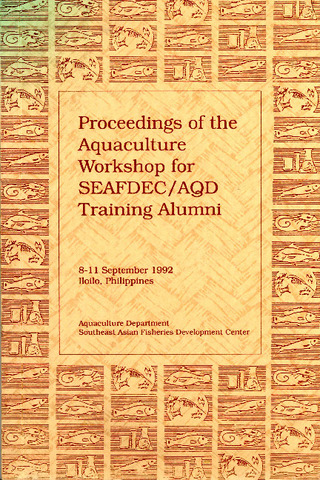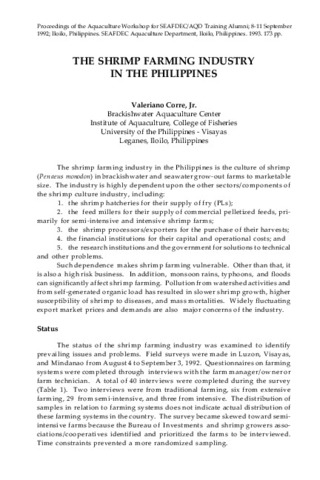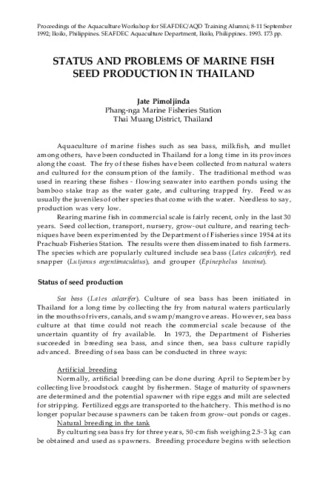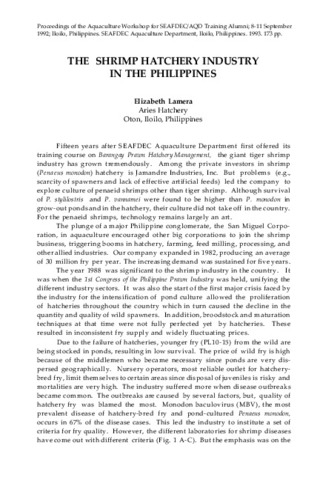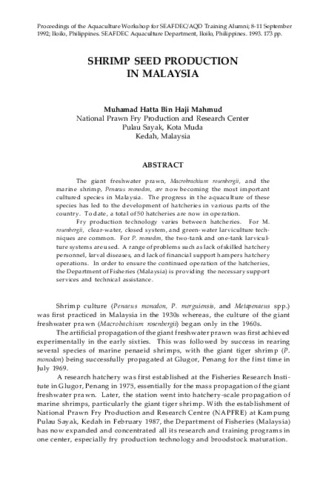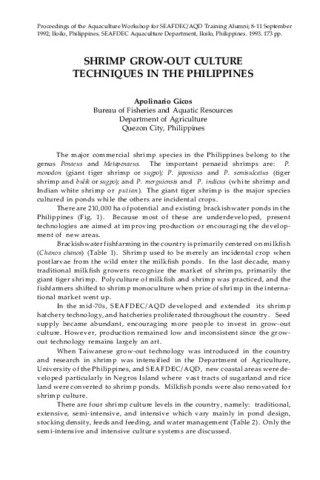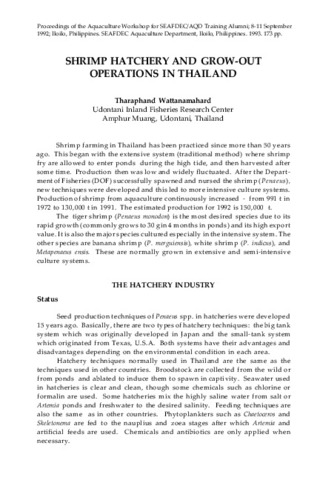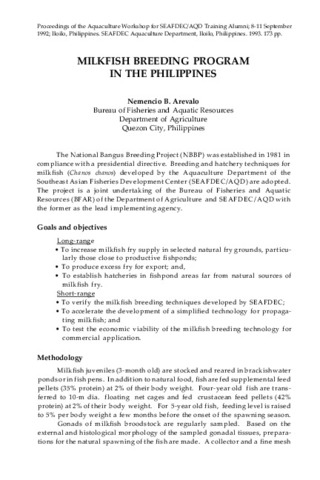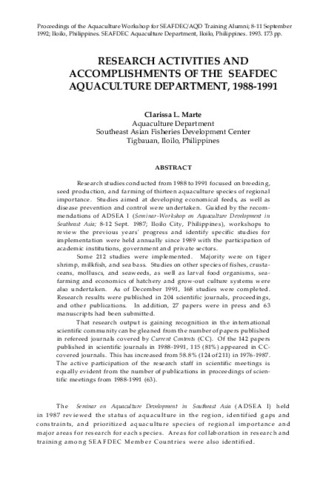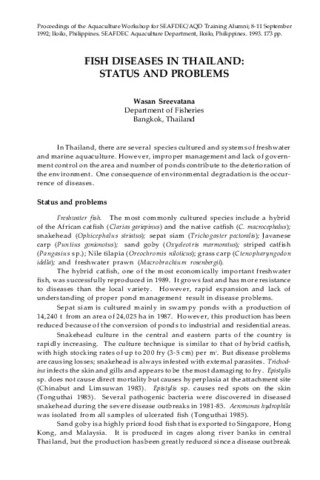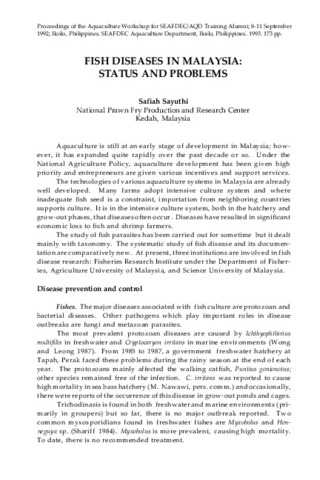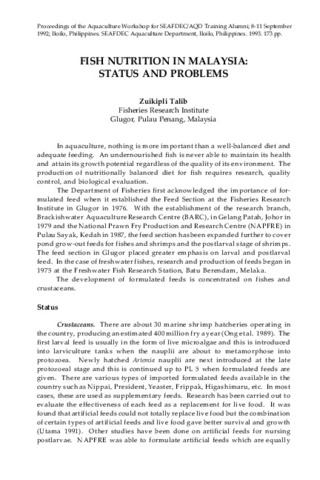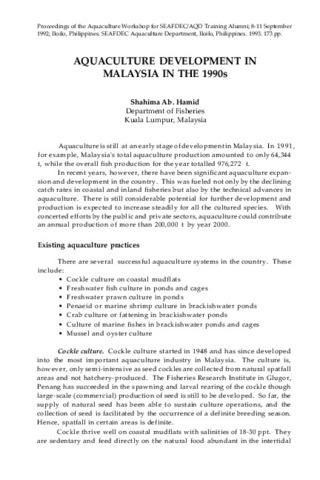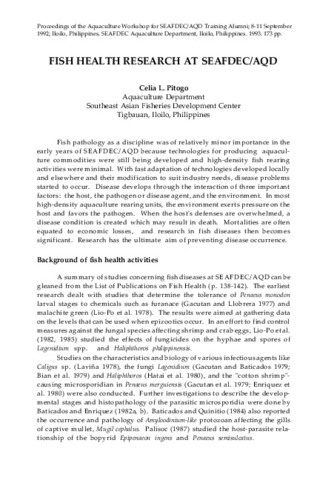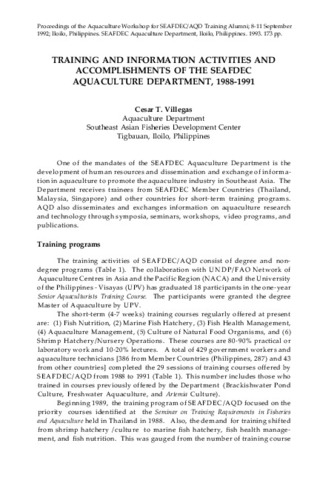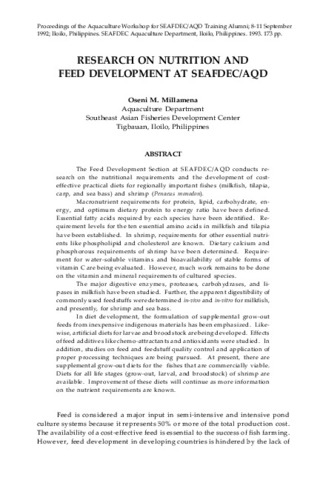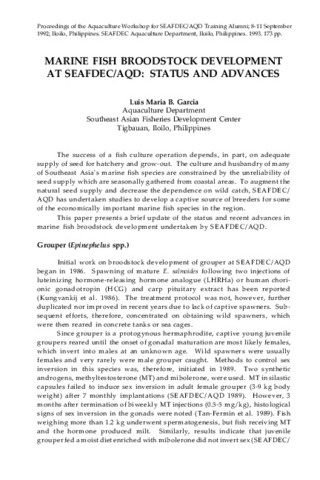Proceedings of the Aquaculture Workshop for SEAFDEC/AQD Training Alumni
Browse by
Proceedings of the Aquaculture Workshop for SEAFDEC/AQD Training Alumni, 8-11 September 1992, Iloilo, Philippines.
Edited by C.T. Villegas, M.T. Castaños, and R.B. Lacierda. Contains country papers and the experiences of former AQD trainees, now aquaculture practitioners. Includes review of AQD research, training, and information dissemination from 1988 to 1992, and an assessment of the manpower needs in aquaculture.Recent Submissions
-
Proceedings of the Aquaculture Workshop for SEAFDEC/AQD Training Alumni, 8-11 September 1992, Iloilo, Philippines
(Aquaculture Department, Southeast Asian Fisheries Development Center, 1993)The workshop was conducted to maintain linkage between Southeast Asian Fisheries Development Center, Aquaculture Department and its alumni. It also aimed to: assess the effectiveness of the training alumni and among trainees; ... -
The shrimp farming industry in the Philippines
(Aquaculture Department, Southeast Asian Fisheries Development Center, 1993)The shrimp farming industry in the Philippines is the culture of shrimp (Penaeus monodon) in brackishwater and seawater grow-out farms to marketable size. The industry is highly dependent upon the other sectors/components ... -
Status and problems of marine fish seed production in Thailand
(Aquaculture Department, Southeast Asian Fisheries Development Center, 1993)Aquaculture of marine fishes such as sea bass, milkfish, and mullet among others, have been conducted in Thailand for a long time in its provinces along the coast. The fry of these fishes have been collected from natural ... -
The shrimp hatchery industry in the Philippines
(Aquaculture Department, Southeast Asian Fisheries Development Center, 1993)Fifteen years after SEAFDEC Aquaculture Department first offered its training course on Barangay Prawn Hatchery Management, the giant tiger shrimp industry has grown tremendously. Among the private investors in shrimp ... -
Shrimp seed production in Malaysia
(Aquaculture Department, Southeast Asian Fisheries Development Center, 1993)The giant freshwater prawn, Macrobrachium rosenbergii, and the marine shrimp, Penaeus monodon, are now becoming the most important cultured species in Malaysia. The progress in the aquaculture of these species has led to ... -
Shrimp grow-out culture techniques in the Philippines
(Aquaculture Department, Southeast Asian Fisheries Development Center, 1993)The major commercial shrimp species in the Philippines belong to the genus Penaeus and Metapenaeus. The important penaeid shrimps are: P. monodon (giant tiger shrimp or sugpo); P. japonicus and P. semisulcatus (tiger shrimp ... -
Shrimp hatchery and grow-out operations in Thailand
(Aquaculture Department, Southeast Asian Fisheries Development Center, 1993)Shrimp farming in Thailand has been practiced since more than 50 years ago. This began with the extensive system (traditional method) where shrimp fry are allowed to enter ponds during the high tide, and then harvested ... -
Seed production of marine fish in Malaysia
(Aquaculture Department, Southeast Asian Fisheries Development Center, 1993)Aquaculture especially brackishwater fish culture in Malaysia has a very high potential for development. It is also a very important source of protein. The three major species cultured in cages are sea bass, grouper, and ... -
Milkfish breeding program in the Philippines
(Aquaculture Department, Southeast Asian Fisheries Development Center, 1993)The National Bangus Breeding Project (NBBP) was established in 1981 in compliance with a presidential directive. Breeding and hatchery techniques for milkfish (Chanos chanos) developed by the Aquaculture Department of the ... -
Research activities and accomplishments of the SEAFDEC Aquaculture Department, 1988-1991
(Aquaculture Department, Southeast Asian Fisheries Development Center, 1993)Research studies conducted from 1988 to 1991 focused on breeding, seed production, and farming of thirteen aquaculture species of regional importance. Studies aimed at developing economical feeds, as well as disease ... -
Fish diseases in Thailand: Status and problems
(Aquaculture Department, Southeast Asian Fisheries Development Center, 1993)In Thailand, there are several species cultured and systems of freshwater and marine aquaculture. However, improper management and lack of government control on the area and number of ponds contribute to the deterioration ... -
Fish diseases in Malaysia: Status and problems
(Aquaculture Department, Southeast Asian Fisheries Development Center, 1993)Aquaculture is still at an early stage of development in Malaysia; however, it has expanded quite rapidly over the past decade or so. Under the National Agriculture Policy, aquaculture development has been given high ... -
Fish nutrition in Malaysia: Status and problems
(Aquaculture Department, Southeast Asian Fisheries Development Center, 1993)In aquaculture, nothing is more important than a well-balanced diet and adequate feeding. An undernourished fish is never able to maintain its health and attain its growth potential regardless of the quality of its ... -
Fish nutrition in Thailand: Status and constraints
(Aquaculture Department, Southeast Asian Fisheries Development Center, 1993)Aquaculture prior to World War II was limited because marine and freshwater fish catches were still abundant. But shortage of fuel and other necessities led to an increase in food prices including fish. The demand for ... -
Aquaculture development in Malaysia in the 1990s
(Aquaculture Department, Southeast Asian Fisheries Development Center, 1993)Aquaculture is still at an early stage of development in Malaysia. In 1991, for example, Malaysia's total aquaculture production amounted to only 64,344t, while the overall fish production for the year totalled 976,272 ... -
Fish health research at SEAFDEC/AQD
(Aquaculture Department, Southeast Asian Fisheries Development Center, 1993)Fish pathology as a discipline was of relatively minor importance in the early years of SEAFDEC/AQD because technologies for producing aquaculture commodities were still being developed and high-density fish rearing ... -
Training and information activities and accomplishments of the SEAFDEC Aquaculture Department, 1988-1991
(Aquaculture Department, Southeast Asian Fisheries Development Center, 1993)One of the mandates of the SEAFDEC Aquaculture Department is the development of human resources and dissemination and exchange of information in aquaculture to promote the aquaculture industry in Southeast Asia. The ... -
Research on nutrition and feed development at SEAFDEC/AQD
(Aquaculture Department, Southeast Asian Fisheries Development Center, 1993)The Feed Development Section at SEAFDEC/AQD conducts research on the nutritional requirements and the development of costeffective practical diets for regionally important fishes (milkfish, tilapia, carp, and sea bass) and ... -
Shrimp seed production at SEAFDEC/AQD
(Aquaculture Department, Southeast Asian Fisheries Development Center, 1993)Broodstock management and seed production techniques have evolved from laboratory and verification tests that are conducted to increase survival and growth rates of cultured fish species. The present methods of induced ... -
Marine fish broodstock development at SEAFDEC/AQD: status and advances
(Aquaculture Department, Southeast Asian Fisheries Development Center, 1993)The success of a fish culture operation depends, in part, on adequate supply of seed for hatchery and grow-out. The culture and husbandry of many of Southeast Asia's marine fish species are constrained by the unreliability ...

